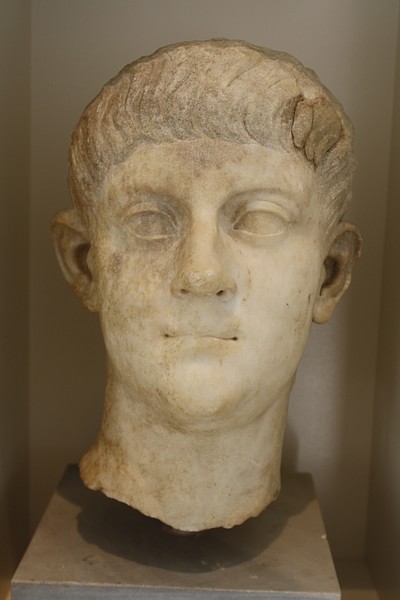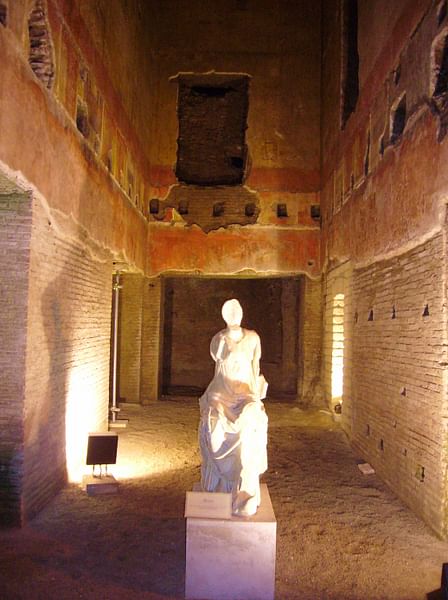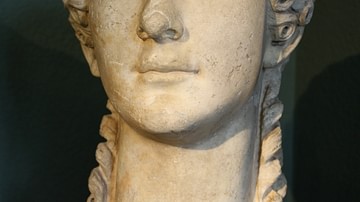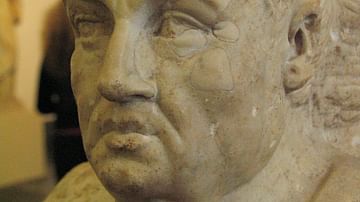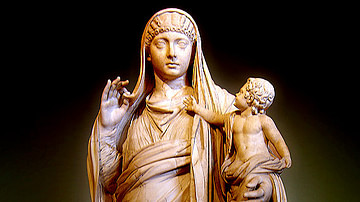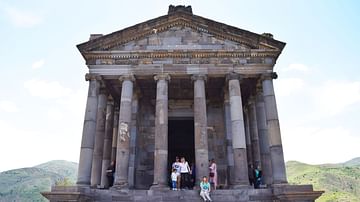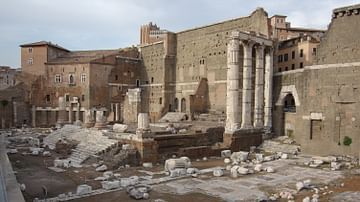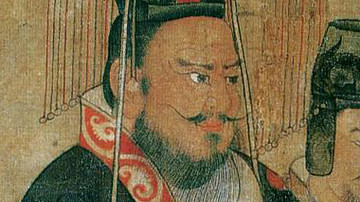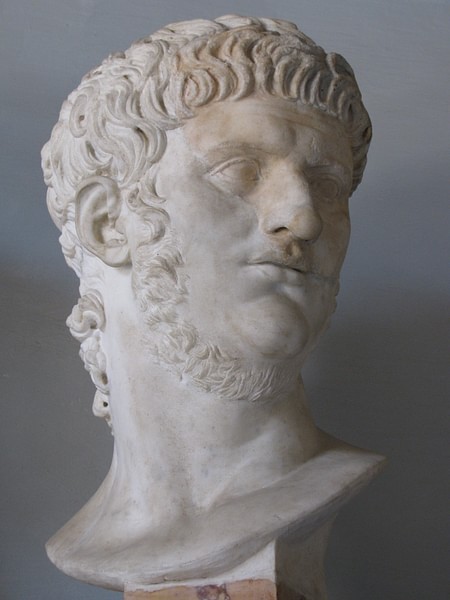
Nero was Roman emperor from 54 to 68 CE. The last of the Julio-Claudian emperors to rule the Roman Empire, his 14-year reign represents everything decadent about that period in Roman history. He was self-indulgent, cruel, and violent as well as a cross-dressing exhibitionist. His lavish parties combined with the burning of Rome continued the economic chaos that had plagued the Roman citizenry since the days of Tiberius (r. 14-37 CE). According to the 1st-2nd century historian Suetonius in his The Twelve Caesars, upon hearing of the emperor's death by suicide, "…citizens ran through the streets wearing caps of liberty as though they were freed slaves."
Early Life
Nero was born Lucius Domitius Ahenobarbus in 37 CE, but he was renamed Nero Claudius Caesar Augustus when his mother, Agrippina, married Emperor Claudius in 49 CE. Some believe Nero's fate was inevitable. His father, Gnaeus Domitius, who died when Nero was three, was extremely violent in his own right and was described by his contemporaries as "a despicable character". He once deliberately ran over a young boy with his chariot as he drove through a local village. When his friends congratulated him upon hearing of the birth of his son, Nero's father said that anything born to Agrippina and him would be unlikeable and a disaster.
Nero's mother was the daughter of Agrippina the Elder and the great-granddaughter of Emperor Augustus (her grandmother was his daughter Julia) – both women, as well as Agrippina's older brothers, were starved to death (the brothers by the order of Tiberius). Her youngest brother was Emperor Caligula (r. 37-41 CE) whose short reign came to a violent end when he was murdered by his own Praetorian Guard thereby bringing her uncle Claudius (r. 41-54 CE) to the throne. After the death of her husband, Agrippina set her sights on the recently widowed Claudius, whose third wife Messalina had been murdered on his orders for, among other reasons, adultery and attempted treason. After a short courtship, they married, and Nero (at his mother's insistence) was soon adopted in 50 CE.
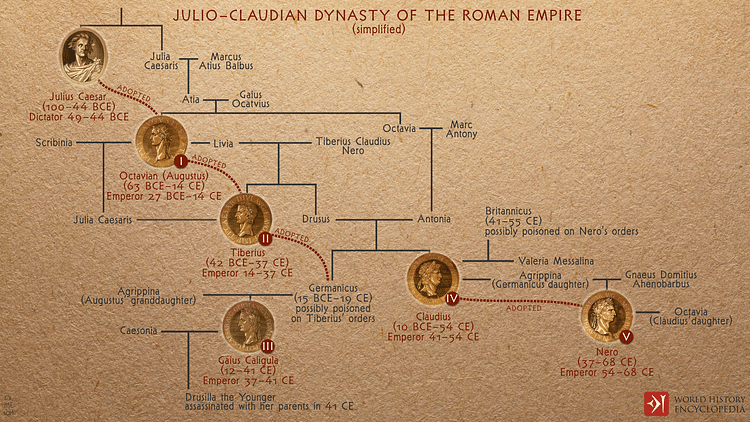
Succession
However, by this time, Agrippina had already taken the next step - the death of Claudius, placing Nero upon the emperor's throne. In 54 CE Claudius mysteriously died after eating a bowl of mushrooms, probably poisoned ones. Some evidence exists suggesting that Nero knew of the poisoning when he later called mushrooms the “food of the gods.” There was also fear that Britannicus (Claudius's legitimate son) might be chosen as emperor ahead of Nero. Suetonius wrote: "He [Nero] tried to poison Britannicus being not merely jealous of his voice … but afraid that the common people might be less attached to Claudius's adopted son than to his real one." Nero's fears soon abated (temporarily) when he was chosen as the new emperor in 54 CE. With his ascent to the imperial throne, Agrippina became the woman behind the man; but not for long.
Among Nero's first acts as emperor was to cancel many of Claudius' edicts and decrees, referring to his predecessor as a "doddering old fool." To the general public Nero was a welcomed change. Like those before him, the early part of Nero's reign was considered by many to be a mini-golden age; the populace believed him to be generous, kind, and accessible. There were lavish games, plays, concerts, chariot races and gladiatorial tournaments, and taxes were even reduced. He restored much of the Roman Senate's power that had been lost over the years, but this restoration had a hidden agenda; it was only done to enable the young emperor to pursue his worldly pleasures, to sing (he did not possess a great voice) and play his lyre. While he sang, no one in the audience was permitted to leave the performance. Suetonius wrote: "We read of women in the audience giving birth, and of men being so bored with the music and the applause that they furtively dropped down from the wall at the rear… and were carried away for burial."
Nero & Agrippina
Although Nero found time for his concerts and games, he had bigger problems at home; his overly protective mother still believed herself to be the true force behind the throne. Agrippina even was bold enough to boast of her influence to others. Nero, of course, found this interference intolerable and made plans to end it. First, he moved her out of the palace. Next, he denied her the protection of her Praetorian Guard and banned her from all gladiatorial contests. Realizing that she was losing her grip on Nero, she fought back by throwing her support behind Britannicus, Nero's stepbrother and Claudius' son, but he mysteriously died at a family banquet - another poisoning victim. It did not take long for Agrippina to realize she was next.
Nero planned his mother's death with great care, even bringing specialists to Rome from Alexandria to assist in the planning. He had an elaborate device created for her bedchamber ceiling which would collapse and crush her in her sleep; however, it proved to be too complicated to build and install. Next, he tried a specially designed boat that would collapse and sink, but she proved too smart and swam to the shore. Finally, his last attempt was the simplest and easiest: he had her stabbed to death, but her death would haunt him for the rest of his life.
Personal Life
Nero's marriages and affairs also proved to be troublesome. He was married to the very popular Octavia, the daughter of Claudius and Messalina (a marriage made at his mother's urging) but also having an affair with the very pregnant Poppaea Sabina (his mother detested her). In order to marry her, he accused Octavia of adultery and exiled her, later to be murdered (but made to look like a suicide). Poppaea, whose first husband was Rufius Crispinus (a Roman soldier), was married to the future Emperor Otho at the time of her affair with Nero. On the emperor's orders, Otho was dispatched to the far reaches of the empire.
His exodus and Octavia's death opened the door for Nero's second marriage. It was even suspected that Poppaea was behind Octavia's and possibly Agrippina's death. The historian Tacitus in his Annals wrote:
Length of power had matured his daring, and his passion for Poppaea daily grew more ardent. As the woman had no hope of marriage for herself or of Octavia's divorce while Agrippina lived, she would reproach the emperor with incessant vituperation … 'Why,' she asked, 'was her marriage put off?'
Nero's second marriage was not a happy one. Poppaea and Nero's child died shortly after her birth. Poppaea's next pregnancy ended in tragedy for both. After Nero and she argued late one night (Nero liked to stay out late), he supposedly kicked her in the stomach, killing both her and the unborn child.
Troubles & Disasters: The Great Fire
Although he had good advisors in Burrus and Seneca, the emperor's reign would continue to see one catastrophe after another. First, there was the Piso Conspiracy, an unsuccessful plot to kill Nero, involving at least 19 senators as well as other leading citizens. Its failure brought about the execution of 41 individuals. Although it failed, it led to Nero being forever paranoid and untrusting. Next, there was the failed Boudicca rebellion in Britain as well as numerous insurrections in many outlying provinces including both Judea and Gaul; the latter two were a reaction to increased taxes.
The greatest threat to Nero's reign, however, was the Great Fire, which began on 19 July 64 CE and lasted for six days. Ten of the 14 districts of the city were destroyed, hundreds died, thousands were left homeless, and looters ravaged the city. Since the fire, many questions have been raised. Did Nero play his lyre (not a fiddle which had not been invented) in the safety of the palace complex while the city burned? Did he start it? Historians differ in their response to these questions. Was he even in the city or did he watch it burn? Suetonius wrote: "Nero watched the conflagration from the Tower of Maecenas enrapt by what he called 'the beauty of the flames'; then put on his tragedian's costume and sang …" Tacitus seemed to remain neutral when he wrote: "A disaster followed, whether accidental or treacherously contrived by the emperor, is uncertain, as authors have given both accounts, worse, however, and more dreadful than any which have ever happened to this city by the violence of fire." The blame fell, of course, upon the heads of the persecuted Christians who had always viewed Nero as the anti-Christ.
Although he had to raise taxes to finance the rebuilding of Rome, the city was better in some ways than before: rebuilt residential districts, wider streets, brick buildings, and colonnades at street level to shelter to residents from the sun. Of course, the new Rome also included Nero's Golden Palace (later to be buried by Emperor Trajan), containing gold plated ceilings, a lake, and exotic animals. Those who believe Nero started the fire point to his palace as the underlying reason.
Suicide
The fire, the conspiracy, the numerous insurrections, and the empty treasury led to Nero's demise. The Senate declared him an enemy of the public and named Galba as the new emperor. Realizing his days as emperor were over, Nero attempted suicide while in the villa of his freedman Phaon but he failed and needed help to take his own life. His last words were: "What an artist dies in me."
